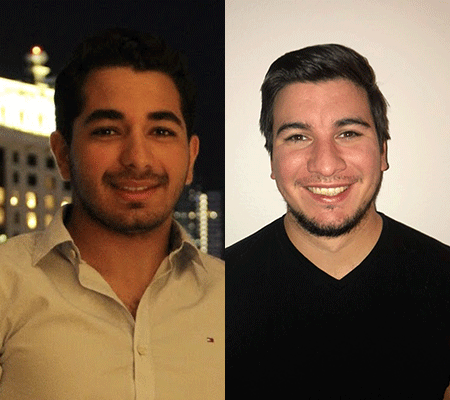Engineering Grad Students Nearly Sweep New Fellowships
 Dec. 21, 2017 - A new UC Irvine graduate fellowship was created this year, open to all doctoral students working on their dissertations. After considering nominations from across UCI for the three available awards, the selection committee chose two students from the Samueli School (along with one from the School of Social Sciences) as winners of the William R. Harburger Memorial Dissertation Fellowships.
Dec. 21, 2017 - A new UC Irvine graduate fellowship was created this year, open to all doctoral students working on their dissertations. After considering nominations from across UCI for the three available awards, the selection committee chose two students from the Samueli School (along with one from the School of Social Sciences) as winners of the William R. Harburger Memorial Dissertation Fellowships.
Korosh Vatanparvar, Department of Electrical Engineering and Computer Science, and Christian Bustillos, from the Department of Chemical Engineering and Materials Science, each won a $12,000 fellowship to cover tuition and fees.
The new fellowship was endowed by the estate of Richard Harburger in memory of his late son, William R. Harburger. Applicants were required to be full-time, first-generation doctoral students who had advanced to candidacy and who had maintained a GPA of at least 3.7.
Vatanparvar, whose adviser is EECS Assistant Professor Mohammad Al Faruque, researches approaches that can make buildings and vehicles more energy efficient. He has designed novel algorithms that enable homeowners to better manage their utilities to avoid consuming unnecessary energy. He also has proposed new controllers that can optimize electric vehicle batteries for more efficient charging and air conditioning, as well as making them harvest more energy during each trip, which extends driving range and battery life.
“I am truly honored to receive this award, and I’m very grateful for the support I have received in my Ph.D. path,” said Vatanparvar, who expects to finish his dissertation in spring 2018.
Bustillos, whose adviser is ChEMS Associate Professor Mikael Nilsson, is working to improve reprocessing of used nuclear fuel. Because the growth of nuclear energy is limited in large part due to concerns over the radioactivity of used fuel, Bustillos’ research involves developing organic compounds that can selectively bind to certain elements in the used fuel. This allows these elements, called mid-actinides (uranium, neptunium, plutonium and americium), to be identified, separated from all the other elements and more easily removed. They can then be used in advanced fuels for next-generation nuclear reactors or destroyed. The process can reduce used fuel’s radioactivity, and Bustillos hopes it will lead to increased public acceptance of nuclear energy.
“I was surprised and excited, and incredibly grateful for the generosity of the Harburger estate,” Bustillos said of receiving the fellowship. He plans to finish his doctoral dissertation during winter quarter, 2018.
- Anna Lynn Spitzer
